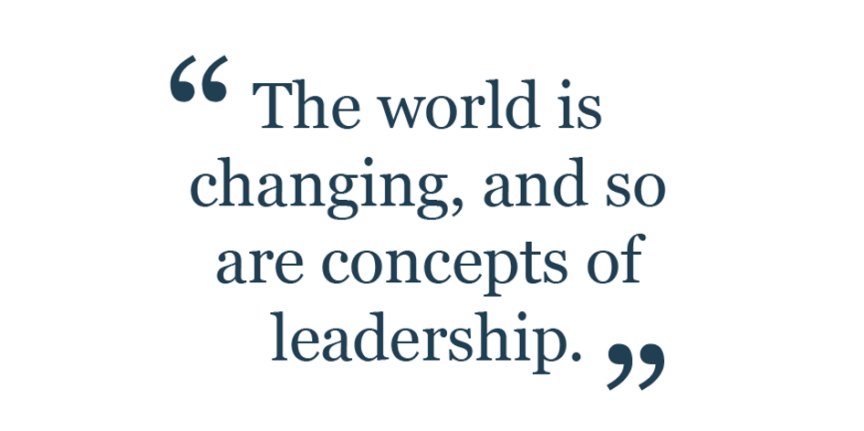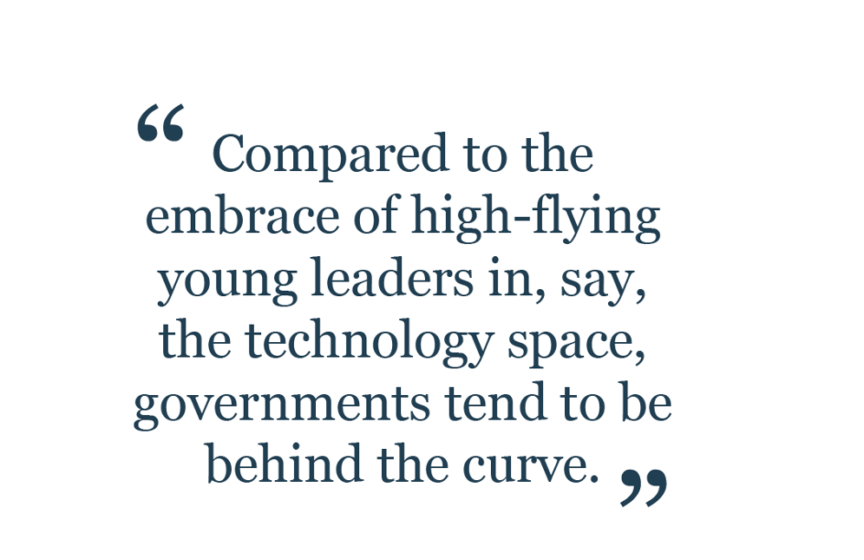Tomorrow’s leaders today:
Harnessing the potential of young leaders in government
By Ahmed Iqbal

Shifting perceptions of government leadership
“If you stick to the status quo and don’t consider new ideas, you get left behind.”
That is the advice to governments that Geordin Hill-Lewis shared when speaking about his successful campaign to become Cape Town’s youngest mayor in over a century. At age 34, he is one of the dynamic young leaders transforming governments across the globe.
Conventional wisdom has it that leaders should have decades of experience under their belts. Indeed, in most countries the head of state is significantly older than the median citizen.1 The next United States election will be fought by the two oldest presidential nominees in American history – beating their own record set four years ago.
But the world is changing, and so are concepts of leadership. Although the “elder statesman” model still holds, Rishi Sunak, Jacinda Ardern and Emmanuel Macron were elected as the youngest heads of state their countries had seen in generations.
Everywhere in the world, young people are attracted to opportunities for meaningful and responsible work. They bring the skills and attitude required to navigate the rapidly changing social and political landscape.
Despite these strengths, and some highly visible examples, young leaders often encounter resistance. There is a lack of awareness of their value at all levels, including in the often traditionalist and bureaucratic civil service. But governments can benefit greatly from youthful drive and passion – and they have a responsibility to nurture a new generation of leadership.

The power of youth
In many ways, young leaders are valuable for rather than despite their inexperience. While older officials have the advantages of hard-earned wisdom and experience, youngsters bring new perspectives.
For one thing, young leaders drive innovation. Instead of allowing ingrained biases to shape their approach, they’re willing to counter the status quo, particularly on issues that impact them. The tasks of modern government – juggling complex geopolitics while also delivering core services – often demand cross-silo flexibility, and young people generally have the adaptability and open-mindedness required to meet these challenges.
Another key advantage is familiarity with trends, particularly in technology. Young leaders can act as crucial bridges between traditional governance and the digital era. There is a need for such individuals: recent congressional hearings on topics such as data protection and online child safety, for example, have highlighted gaps in technological understanding in the US federal government.2 As digital natives, young people are not only aware of emerging tech – they’ve grown up with it, from Fortnite to TikTok. They bring the knowledge and experience of emerging trends that older officials can lack.

Rising against resistance
In some countries, youthful energy, ambition and intellectual curiosity is recognised and rewarded. A prominent example is Saudi Arabia, which benefits from a young working population. Here, ambitious plans for societal, economic and infrastructural change mean that young people are drawn into government, often fronting huge public projects.3 According to one young Saudi leader working in a key area of government, “Young people are driving the change in the country. Most people being promoted around me to lead teams and strategic initiatives are young.”
But acceptance of young leaders has been slower in other administrations. Compared to the embrace of high-flying young leaders in, say, the technology space, governments tend to be behind the curve. In many countries, established leaders view government responsibilities as too important to get wrong and see experience as a way to prevent that from happening. Many joined the civil service for stability and consistency – with “change” and “innovation” no more than buzzwords. Some oppose change in the bureaucratic systems that they benefit from.
James Davies, current managing partner at Consulum, experienced this resistance to change first hand. In his twenties, he assumed the role of head of budget policy at the UK Treasury: “When I first joined the government, I made a lot of people uncomfortable, simply by saying that I didn’t want to do things just because ‘that’s how it’s done’.”

Other factors pull young people away from government service. The private sector offers the salaries, mobility and attainable short-term achievements that many ambitious young recruits are after. Government, with its necessarily slower and more bureaucratic approach, can seem a much less attractive option. In many administrations, young talent is underutilised or constrained by rigid career paths.
“The public sector has a bad reputation as an employer,” confirms David Savage, a former provincial treasurer in the South African government. “It’s not competitive financially … retaining young talent is also difficult because the scope of their roles can’t expand as quickly as capabilities expand. This can be frustrating.”
Given these obstacles, how do governments encourage young individuals to join their ranks and best utilise their skills? Top talent is highly mobile; to retain it, governments need to create a hospitable environment for these individuals, appreciate their dynamism and fresh perspectives, and ensure their development.
To this end, Consulum has set out a three-point approach to attract, recruit and develop youth leadership:
1. Attracting young talent: The power of meaningful work
There is a unique tool in the government kit: the chance to make a genuine impact. Government offers unparalleled opportunities to dive straight into interesting, important, highly responsible work, from small policy focus areas to emerging geopolitical issues. A bright young leader at the start of their career might find themselves at the table in a bilateral trade negotiation, in parliament defending policy or chairing a meeting with future prime ministers.
The young Saudi official mentioned earlier said that he’d intended to join the private sector after graduating, but changed his mind when Saudi Arabia was chosen to lead the G20 summit: he felt the need to give more to his country and “be a part of the change”. This desire to make a social difference is a global motivator for young people.
Government can draw lessons here from the broader public sector. Teach for All, a global network of organisations that aims to recruit their countries’ “most promising future leaders” to teach in high-need schools, demonstrates just how powerful purpose is as a motivator in public service careers (see below).
Teach for All: Inviting the most promising future leaders into teaching
Teach For All is a global network of organisations which each target their respective countries’ most promising graduates and encourages them to work in teaching.1 The network’s independently run organisations across 62 countries have recruited over 100,000 young professionals and reaches more than a million learners each year. The programme is an outstanding example of redirecting young talent towards public service.
Essentially, what the organisation is selling is an opportunity for young talent to make an impact on an issue they care about. Phil McComish, Global Head of Public Affairs for Teach for All, told us that he believes this appeals to young people’s desire to make the world a better place: “Ambition is not a bad thing, but it’s not just about money – it can be channelled by teaching in high-needs schools and working towards the bigger picture.”
Perhaps the clearest testimony to the success of this initiative is its retention rate. Most of these talented young recruits stay in teaching beyond the initial two-year programme; a remarkable two-thirds never leave the education ecosystem.
1. Teach for All, Teachforall.org.

2. Recruiting young talent: Potential over experience
In seeking talent, traditional organisations tend to place great importance on years of experience – but not all experience is good. Yes, amid growing geopolitical and economic uncertainty, seasoned leadership ensures continuity and stability; but by relying solely on experience, governments risk perpetuating the status quo, growing disconnected from the operational reality and diverse perspectives of the workforce.
Governments should seek to shift their criteria, focussing more on competency and potential than experience. Adaptable mindsets and diverse life experiences can prove more valuable than lengthy CVs. When hiring, governments can maximise opportunities to bring in young talent by considering the concept of “proportional achievement”: not only what a candidate has achieved, but also what they have overcome to get there.
3. Developing young talent: Learning on the job(s)
The core principle of any graduate scheme, in both public and private sectors, is learning on the job. The quickest way to do this is to rotate roles frequently – contrary to conventional career advice to invest years in early posts.
Youth is a time of flexibility and freedom: young workers should be given the opportunity to learn from experimentation, the ability to change direction and make mistakes. In a 12-month stint, a young prospect should be empowered to deliver impact – and then move on to other roles, building a broad foundation for future leadership. The United Kingdom’s award-winning Fast Stream programme, for example, encourages entrants to work in different civil service departments (see below). Flexibility also allows top talent to be promoted more quickly where appropriate.
It’s important to foster a culture of recognising and developing young leadership at all levels. True leadership entails motivating and inspiring others, which can happen in any role and at any grade.
Fast Stream: Growing the ranks of the UK’s young leaders
The civil service is one of the largest employers in the UK. The Fast Stream graduate programme has been developed to feed its ranks, giving young people experience of working in different departments and developing them to become future leaders and managers.1 The Fast Stream is now the UK’s leading graduate placement scheme, its success recognised by several awards – for example, it garnered second place overall in the most recent The Times Top 100 Graduate Employer of the Year awards.2
High-potential young people from all walks of life are welcomed into the programme, attracted by competitive starting salaries, flexible working arrangements, a wide range of career directions and the chance to play a meaningful role. “We offer the unique opportunity to contribute to challenging, fast-paced work that makes a difference to the whole of society,” the Fast Stream website promises. “We help to shape the decisions that will affect everyone’s lives and to deliver the public services that we all rely on.”
Being a “Fast Streamer” is an inherent acknowledgement of leadership potential. Fast Streamers are often given significant roles with hefty responsibilities, allowing them to cut through hierarchies to propose government initiatives that make meaningful impact. Most use the skills and experience gained through this process to rise through the ranks and by the end of the programme are leading their own teams.
1. Civil Service Fast Stream, faststream.gov.uk.
2. The Times Top 100 Graduate Employers 2023-24, top100graduateemployers.com.
Passing the baton to a new generation
Long-term, sustained leadership remains a difficult task that demands perseverance and patience. Young leaders are ready to step up and claim these roles. They will do the hard work of developing leadership capabilities, valuing the wisdom and experience of those around them while bringing innovation, impact and flexibility. As they mature and progress, they will be judged by their credibility and ability to deliver under pressure.
Governments should encourage this journey, which is of benefit to all: organisations, young leaders themselves and the countries they serve so passionately.
As Sarah Elago put it when, at 29, she was the youngest lawmaker in the Congress of the Philippines: “That’s where the power of the youth is … this is the point in our lives when we have extraordinary energy and creativity. In our history, we have seen how our heroes were at the peak of their youth when they were inspired to take action.”[4]

About the author
Ahmed is a specialist in government, government relations and organisational design. With experience across a range of UK government departments, he has led European bilateral relations at the UK Department for Business, Energy and Industrial Strategy as well as building and leading the implementation unit for the Economic Crime Bill. He was also head of business engagement strategy at the Department for International Trade, where he played a leading role in the development and delivery of the UK’s Trade Advisory Groups.
References
[1] Laura Silver, “How Biden, 80, stacks up in age against other world leaders”, Pew Research Center. March 24, 2023.
[2] C. Kang and A. Satariano, “As A.I. Booms, Lawmakers Struggle to Understand the Technology”, The New York Times, March 3, 2023.
[3] “Saudi Vision 2030: The story of transformation”, vision2030.gov.sa.
[4] Sofia Santelices, “Women Youth Voices: Sarah Elago on being one of the youngest lawmakers in the Philippines”, Preen. August 20, 2019.
